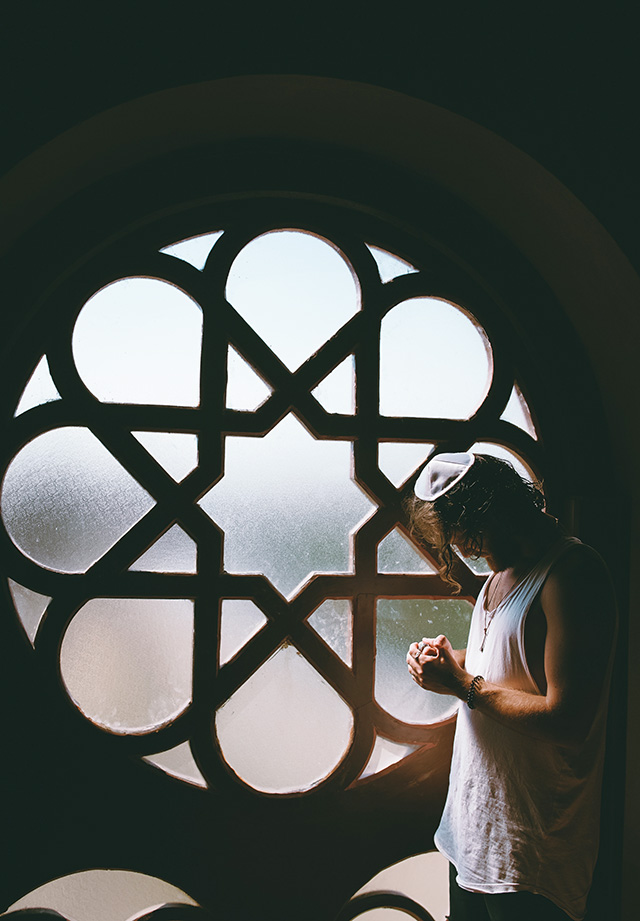Growing up, the Jewish High Holidays meant agonizing hours in temple:
The memories of chorus music accompanied by an organ.
Standing up, sitting down, and reading the passages I knew in Hebrew with reciprocation in English.
The time of year focusing heavily on tradition—from the food to the family gatherings, and the many hours spent praying, while dressed in uncomfortable clothes.
And listening to the rabbi go on and on about atonement, becoming a better human being, how awesome G-d is, and doing our part to repair the world.
Sometimes my friend and I would sneakily escape through the back door of the temple, outside to the jam-packed parking lot to sit in our parent’s car and crank 80s music. Within the safety of the car, we went to the extreme—pretending aliens were attacking or screaming at the top of our lungs. No one could hear us or save us. It felt so good to release all the tension of our teenage angst.
As time went on, I began to feel more and more secular, and less and less religious.
I felt Jewish. But I didn’t feel connected to the traditions. Although we were taught to question everything, I just lost interest and traditions became more of “we do it this way because this is how it has always been done.”
As an adult, I stopped attending temple on the High Holidays all together and didn’t really miss it until I started a family of my own. The traditions came back, with my own flare—yet it felt like something was missing.
Fast-forward a few years, my son is two years old and we’re living in an extended-stay hotel; a flood in our house has caused us to move out for six months. The sterile room with uncomfortably thin mattresses caused me to wake up like clockwork every night and wander in the darkness. I would turn on the TV and there he was every time—Wayne Dyer, pacing the stage, talking about the power of intention. He wasn’t trying to sell his book, his message felt genuine. His path was personal and natural. Wayne showed me what spirituality, faith, and hope looked like—and I felt as if he was talking to me one-on-one each night.
Those nights were the catalyst that ignited the expansion of my spirituality over the last 14 years.
Yom Kippur is all about atonement, asking for forgiveness, and hope for inscription in the Book of Life for another year. For many years, I approached this holiday with tremendous cynicism. I could not understand how one day of fasting, asking for forgiveness, and self-reflection could change anything. It seemed like everyone was there to see friends, check out what they were wearing, and to whisper during the whole service. How was this about self-reflection at all? I felt so disconnected from the rabbi and his sermons felt so contrived—when I did listen.
Truthfully, I’ve avoided self-reflection on Yom Kippur for years. Now that I have explored my spirituality through the Bhakti path, I haven’t felt the need. It’s not that I don’t atone—believe me, those wakeful and tortuous nights really helped me to ask forgiveness through repetitive ruminations.
Although I still struggle with the traditional service, I think this year I will approach it differently by letting go of all my past attachments to what you’re supposed to do and just create my own new experience.
I’ve recently found a “different service” available in my community which is intriguing. I’m approaching it with curiosity and asking myself these questions:
What if I do a fast for the whole day?
What activities will I put in place for daily self-reflection over the 10 days between Rosh Hashanah and Yom Kippur?
Do I truly feel I can use this day as a retreat for myself?
How can I create rituals using my experiences from a Jewish lens?
Can I open my heart in a way that I have not done before?
There must be a reason for all these rituals to exist as Judaism is one of the oldest traditions.
Having a whole holiday dedicated to reflection and forgiveness is one of the greatest gifts one can possess.
Focusing on forgiveness for 10 days—the rabbis must have been onto something!
And with forgiveness also comes compassion. Compassion sparks a goodness that can only grow if extended.
I’m curious to find out what—if any—transformative experience these rituals can truly have on my life, and in turn those I interact with, that is, after I’m done fasting.







Read 0 comments and reply